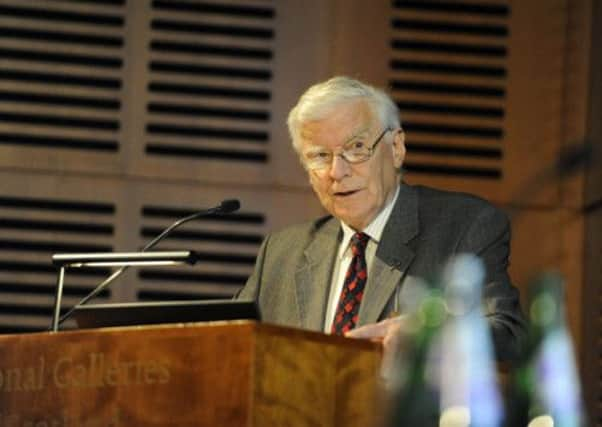Scottish independence: McCrone wary of ‘upheaval’


• Former chief adviser at Scottish Office writes new book on independence
• McCrone says Scotland “could well” be successful as independent, but warns of “major upheaval”
Advertisement
Hide AdAdvertisement
Hide Ad• Scottish Government economic plans built on sources that would need to be negotiated over with UK, says McCrone
Gavin McCrone, former chief economic adviser to the Scottish Office who also led the industry and development departments of the Scottish Government, has written a new book weighing up the economics of independence.
Mr McCrone, whose advice that North Sea oil could transform an independent Scotland’s fortunes was suppressed by the UK Government in the mid-1970s, writes that 2014 is not the best time for independence in the wake of a recession, with high public debt and an unsustainable budget deficit.
But he warns that a no vote also risks severing Scotland’s vital ties with Europe and a flight of foreign investors if the UK then votes to leave the EU in the Conservatives’ in/out referendum.
The Scottish Government’s plan to circumvent the normal EU accession process “might be possible” in the event of independence with the goodwill of the other member states, but countries with secessionist movements like Spain could veto it.
Negotiating opt-outs of the euro and Schengen free travel zone “might also be reasonable”, but there is “no prospect of Scotland being able to retain a share of the UK budget rebate”, he said.
He said: “Scotland is a relatively well-off country and could perfectly well be independent.
“But that does not mean that the process of separation would be easy or painless. It would be a major upheaval with uncertain consequences.”
Advertisement
Hide AdAdvertisement
Hide AdHe added: “The difficult circumstances of the recession, with unsustainable budget deficits and high public debt, does not make (2014) the best time to choose.”
Assumptions
He said the Scottish Government financial plan is based on “assumptions” such as a geographical share of oil and a population, rather than GDP, share of UK debt, all of which are subject to negotiation.
“Negotiations between the UK and other countries over their share of the continental shelf have not always been straightforward. Sometimes they are protracted.”
He welcomed SNP plans for an oil fund, arguing this was a “missed opportunity” by previous UK governments, but said “in the immediate future Scotland would be unable to afford it”.
“Public expenditure will then have to be paid for from non-oil tax revenue, which would be insufficient to cover it,” he said.
“Despite many assertions that Scottish control of economic levers would result in higher economic growth to pay for this, no one has really explained how this would be achieved. Without it, cuts in expenditure would be necessary.”
He added: “While I think it would be sensible for an independent Scotland to remain with sterling, at least initially, it might prove difficult in the long run; and, to gain freedom to follow its own policies, it may be necessary for Scotland to have its own currency.”
On EU membership, he wrote: “Membership of the EU is very important for Scotland because so many inward investment companies have chosen it as a base from which to serve the European market. If Scotland was outside the EU, it would be more difficult to attract inward investment and, depending on what agreement was reached on access to the single market, some of those already in Scotland may leave.
‘EU referendum could boost independence support’
Advertisement
Hide AdAdvertisement
Hide AdHe added: “If, therefore, it seems increasingly likely that the UK will leave the EU, the logical consequence could be an increase in support for independence.
He also said an independent Scotland “probably could not afford” to pay the subsidies required for development of renewable energy, and questioned whether the rest of the UK would continue to pay for it.
He concluded: “After Ireland became independent in 1922 it was a long time - at least a generation - before policies were adopted that began to bring the country to the high level of prosperity it was able to achieve and, despite the severe effect of the financial crisis, still has. I would not expect that to happen in Scotland but it would take some time.”
He added: “If independence is rejected, however, there is is a real danger that politicians at Westminster and officials in Whitehall may think they can put away the files and not worry about Scotland anymore.
He said the UK is increasingly dominated, both politically and economically, by London and proposes a range of devolution and wealth distribution measures.
“It is time to alter the balance for the sake of all parts of the United Kingdom,” he said.
Scottish Independence: Weighing Up The Economics, by Gavin McCrone, is due for release on August 1.
MORE ON SCOTTISH INDEPENDENCE